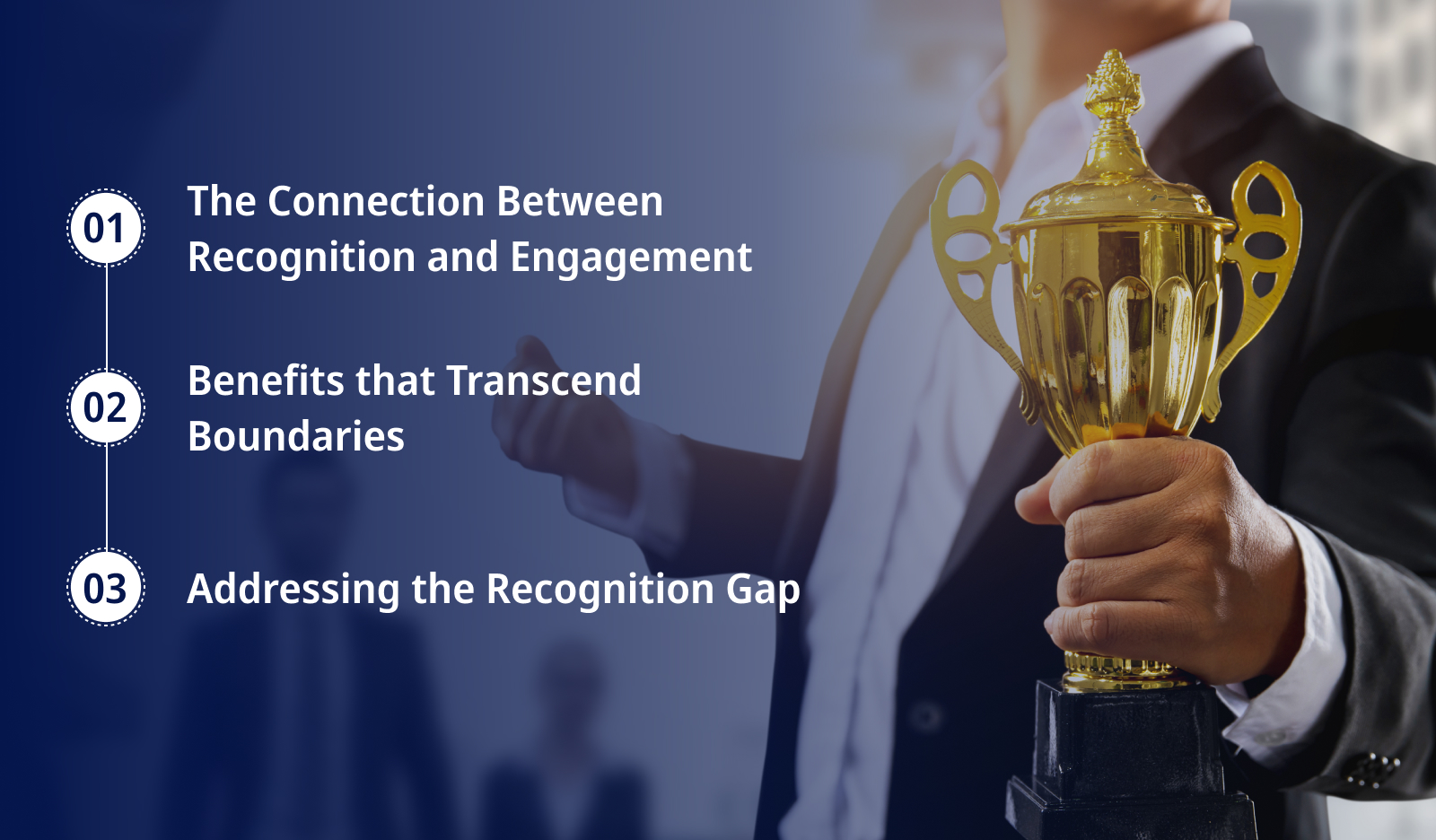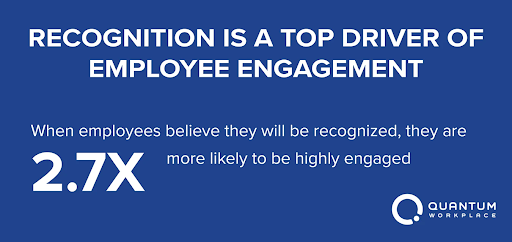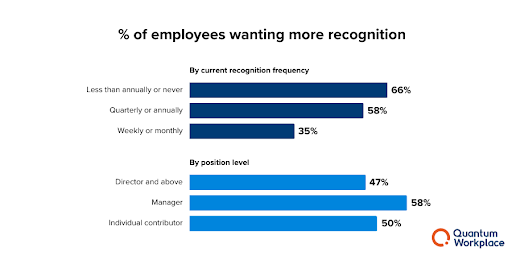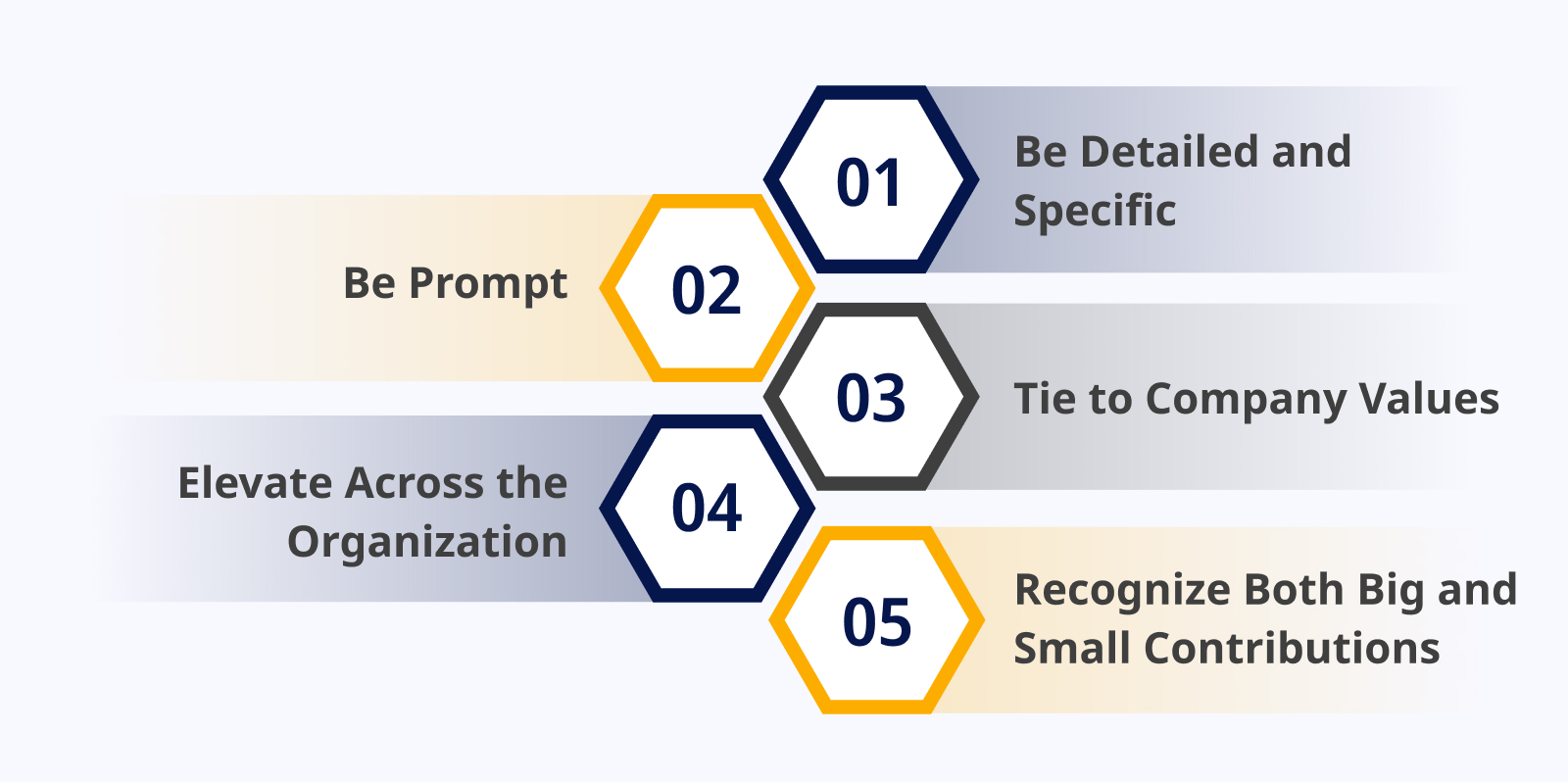Have you ever wondered what truly inspires employees to go the extra mile, to put their best foot forward day in and day out? In the bustling world of businesses, where targets and deadlines often take center stage, the importance of employee recognition is an often underestimated force that can make all the difference. Small gestures like a simple “thank you” or a shout-out for a well-done job create an immeasurable impact.
In a recent survey that delved into employees’ hearts, a revealing question was asked: “What does your manager or company currently do to motivate you to produce great work? The responses echoed a resounding sentiment – 37% of participants emphasized the significance of personal recognition. Recognition holds the key to unlocking a higher level of dedication and performance.
Join us as we explore employee recognition benefits and dynamics – why it matters, its diverse forms, real-life examples, and strategies for a successful recognition program. Discover how a simple “thank you” can reshape workplace motivation, fostering a culture of appreciation that drives excellence. So, let’s delve into the compelling world of recognition and its profound impact on employee motivation and productivity.
What is employee recognition?
The importance of employee recognition goes beyond compliments; it’s the heart of appreciation crafted into workplace culture. Acknowledging and applauding employees’ accomplishments or behaviors is an integral tool for organizations. Its impact is profound, motivating, reinforcing, and cultivating a culture of excellence.
-
Showcase Goal Achievement
Simple gestures like a heartfelt “thank you” resonate deeply. When employees accomplish goals, they seek acknowledgment. Praise and recognition in the workplace amplify the satisfaction of success, spurring individuals to strive for more.
-
Motivate Effort
Beyond performance, recognize dedicated effort. Honoring those who go the extra mile establishes emotional bonds that drive future performance. Recognition isn’t just about past achievements; it’s a catalyst for future excellence.
-
Reinforce Values
Frequent recognition highlights valued behaviors. A positive cycle is set in motion when employees are acknowledged for embracing company values. They continue to uphold these behaviors, influencing others positively.
As we delve into the importance of employee recognition, remember that it’s more than routine gestures; it’s a force that fuels growth, unity, and a thriving work environment.
Why Employee Recognition is Important?
Employee recognition symbolizes motivation and engagement in the bustling business landscape, where strategies and goals take precedence. Recognizing employees isn’t just a formality; it’s a strategic tool that fuels growth and unity within an organization.
The Connection Between Recognition and Engagement
Engagement, the vital link connecting dedication, productivity, and contentment, is closely intertwined with recognition. Employees anticipating recognition are 2.7 times likelier to be highly engaged. Recognition isn’t just a nicety; it’s a catalyst for a thriving workforce.
Benefits that Transcend Boundaries
Employee recognition management isn’t a one-sided gesture; it’s a symbiotic relationship that nurtures multiple facets of organizational success:
- Elevated Productivity and Engagement: Recognized employees are engaged employees. Their passion for contribution propels productivity, breathing life into every task.
- Diminished Employee Turnover: Organizations with formal recognition programs experience 31% less voluntary turnover. The benefits of employee recognition programs are wide. When valued, employees are inclined to stay and grow.
- Enriched Satisfaction and Work Enjoyment: A simple “thank you” echoes appreciation, fostering a positive atmosphere that employees relish.
- Amplified Team Culture: Recognition isn’t just about individuals; it cultivates a harmonious team spirit, knitting employees together.
- Augmented Customer Satisfaction: The ripples of recognition extend to customer interactions, enhancing loyalty and satisfaction.
- Fortified Retention of Quality Employees: Employees who feel valued are more likely to remain committed, safeguarding a pool of top-tier talent.
- Mitigated Stress and Absenteeism: Appreciation lightens the load, reduces stress and absenteeism, and contributes to a healthier work environment.
Addressing the Recognition Gap
While recognition holds immense potential, there’s a disparity between employees’ desires and reality. Only 35% receive regular recognition, leaving room for improvement. More than half desire more acknowledgment. This sentiment isn’t confined to specific roles; everyone, from employees to managers, craves recognition to validate their contributions.
The importance of Employee recognition is significance becomes crucial in a world where success relies on teamwork and spirit. It transcends a mere gesture; it’s an investment in engagement, unity, and triumph.
Employee Recognition Examples
In employee recognition management, the right words can ignite motivation and reinforce a culture of appreciation. While each individual is unique, here are some heartfelt recognition examples to light up your employees’ days:
Recognizing Excellent Performance
- “Your unwavering dedication shines through your exceptional work. Your contributions are invaluable to our team.”
- “Consistently driving remarkable business outcomes, you’re a true inspiration. Your impact is felt throughout the company.”
- “Your relentless pursuit of excellence doesn’t go unnoticed. Each day, you set higher standards that inspire us all.”
Recognizing Good Attitudes
- “Your positivity is a beacon that brightens our workplace. Collaborating with you is a true pleasure.”
- “Our team is grateful for your expertise on this project. Your contributions are a cornerstone of our team’s success.”
- “Living our company values comes naturally to you, setting an example that resonates with every team member.”
Recognizing Goal Accomplishment
- “Your resilience in overcoming challenges to meet this goal is truly admirable. Your determination fuels extraordinary results.”
- “Congratulations on surpassing your quarterly goals with finesse. Your skills are a driving force behind our achievements.”
- “Taking on challenges with adaptability and exceeding expectations, your project performance is nothing short of impressive.”
In a world where appreciation speaks volumes, these recognition ideas are the bridges that connect dedication with gratitude. Tailor them to your team members’ unique qualities, and witness the transformational power and importance of employee appreciation and recognition in action.
Creating a Successful Employee Recognition Program
Employee recognition isn’t just a gesture; it’s a strategic approach that fosters engagement and loyalty. While every program is unique, specific guidelines can shape an impactful recognition strategy. Here’s how to create a successful employee recognition program that resonates with your team:
-
Be Detailed and Specific
Connect recognition to specific achievements. Detail what the employee did well and how it contributed to the team’s success. Specificity amplifies the impact and encourages the repetition of positive behaviors.
-
Be Prompt
Timing matters. Recognize achievements promptly, ideally right after they occur. A delayed acknowledgment might lose its sincerity and significance, diluting the motivational effect.
-
Tie to Company Values
Highlight behaviors aligned with company values. When you recognize values-driven actions, you’re not just appreciating the individual but reinforcing the desired organizational culture.
-
Elevate Across the Organization
Spread recognition widely. When recognition transcends teams and departments, it reinforces the sense of being part of something bigger. It also allows everyone to understand the interconnectedness of contributions.
-
Recognize Both Big and Small Contributions
Celebrate the journey, not just the destination. While significant achievements deserve recognition, small contributions should not be overlooked. Daily appreciation cultivates a culture of ongoing support and prevents burnout.
With these best practices as your guiding light, you’re well on your way to nurturing a culture of recognition that fuels employee engagement, enhances retention, and propels your organization toward success.
Conclusion
In a world driven by deadlines and targets, the importance of recognition in workplace emerges as the secret ingredient to elevated motivation and unwavering commitment. From acknowledging exceptional performance to celebrating a positive attitude, recognition weaves a tapestry of engagement that transcends boundaries. It’s not just about words; it’s about cultivating a culture where every effort matters.
Take the first step in transforming your workplace into a hub of appreciation. Harness the power of recognition to unleash your team’s potential and fuel its success. Let’s embark on this journey together – where gratitude sparks excellence.
Are you ready to unleash the potential of your team? Start recognizing their efforts today!






